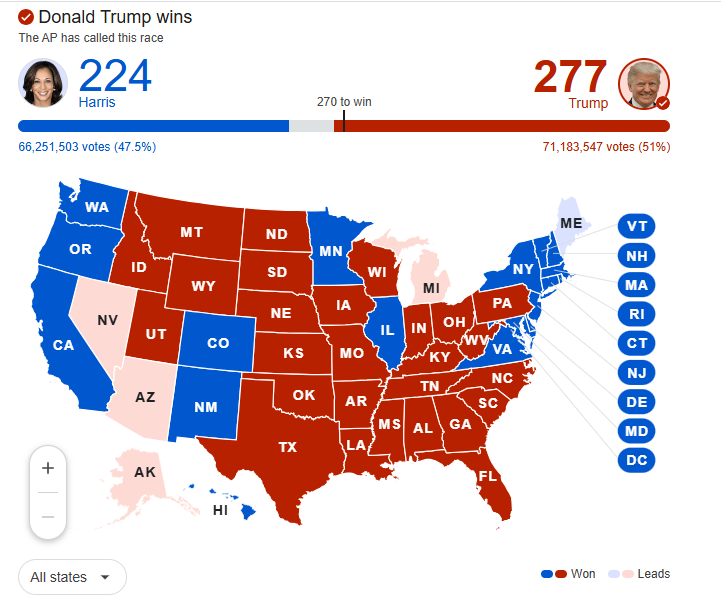Donald Trump has made a stunning political comeback, winning the 2024 U.S. presidential election after securing more than the 270 Electoral College votes needed to reclaim the White House.
The victory, officially projected by Edison Research on Wednesday, November 6, follows a contentious campaign marked by dark rhetoric that intensified national polarization.

Trump’s win in the pivotal swing state of Wisconsin pushed him past the threshold, effectively sealing his return to the presidency after his 2020 defeat.
Speaking to a roaring crowd of supporters at the Palm Beach County Convention Center in Florida early on Wednesday, November 6, Trump declared, “America has given us an unprecedented and powerful mandate.”
This victory represents a dramatic turn of events for Trump, who had appeared politically defeated following the January 6th Capitol insurrection, when a mob of his supporters stormed the U.S. Capitol in an attempt to overturn the results of the 2020 election.
Despite this, Trump managed to consolidate power within the Republican Party, sweeping aside challengers and defeating Democratic nominee Kamala Harris by capitalizing on voter concerns about inflation and crime.
Trump’s return to the White House marks the end of a polarizing election season. While Harris, the vice president-elect, refrained from addressing the press or her supporters at Howard University, campaign co-chair Cedric Richmond told the crowd that “there are still votes to count.” Harris is expected to speak publicly later on Wednesday as more results come in.
The election also saw Republicans taking control of the U.S. Senate, though control of the House of Representatives remains uncertain with both parties vying for the majority.
Economic issues, particularly inflation and job security, dominated the election cycle, with voters expressing frustration over rising prices despite a growing economy and historically low unemployment.
According to Reuters/Ipsos exit polls, many Americans, particularly Hispanic and lower-income voters who have been hit hard by inflation, showed significant support for Trump. His base of rural, white, non-college-educated voters also turned out in full force, helping propel him to victory.
Trump’s victory comes despite his contentious history. Impeached twice, indicted four times on criminal charges, and found civilly liable for sexual abuse and defamation, his record has remained a focal point for critics. In May, Trump was convicted of falsifying business records to cover up hush-money payments to a porn star.
Nevertheless, Trump’s political resilience has been unmatched, with his unorthodox approach to campaigning and his staunch opposition to the Biden administration resonating with a significant portion of the electorate. His victory promises to have far-reaching implications for both domestic and foreign policy.
As president, Trump is expected to lead a policy shift that could have profound effects on U.S. trade, tax, and climate policies. His stance on tariffs could lead to an even fiercer trade war with China, while his proposals to cut corporate taxes may exacerbate the national debt, economists warn. Trump has also vowed to crack down on illegal immigration, launching a mass deportation campaign and possibly targeting those in the country illegally.
During his campaign, Trump indicated that his administration would prioritize loyalty, signaling that individuals with ties to his brand of politics, including tech mogul Elon Musk and former presidential candidate Robert F. Kennedy Jr., could play key roles in his government.
Trump’s return to the White House raises serious concerns about the future of U.S. democratic institutions. His repeated assertions that he intends to fire federal employees he deems disloyal and use the Justice Department to investigate political enemies have prompted fears of increasing political interference in the nation’s law enforcement agencies. Critics worry that the separation of powers and independence of federal agencies could be undermined in a second Trump administration.
Throughout his first term, Trump often faced pushback from within his own cabinet, most notably from Vice President Mike Pence, who refused to block Congress from certifying the 2020 election results. With Trump signaling his intent to reshape the executive branch by appointing loyalists, a second term could deepen the existing divides within the U.S. political system.
With Congress set to certify the results on January 6, Trump and his vice president, U.S. Senator JD Vance, are scheduled to take office on Inauguration Day, January 20, 2025.
Trump’s victory sets the stage for a new chapter in American politics, with a deeply divided electorate watching closely as the former president prepares to confront both domestic challenges and complex international issues, including the ongoing war in Ukraine.
The outcome of the 2024 election is expected to have lasting implications for U.S. policy, shaping not only the nation’s future but also its relationships on the global stage. As the country braces for another era of Trump governance, both supporters and critics alike are preparing for a turbulent ride ahead.